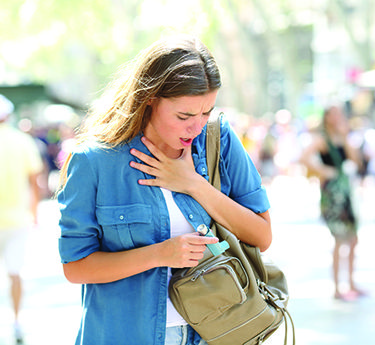Asthma, Chronic Obstructive
Pulmonary Disease (COPD)

Asthma
Asthma is an inflammatory disorder of the airways that results in the production of excess mucus, spasms in the smooth muscle tissue of the bronchial tubes and reduced airflow in the lungs. Many of the same cells responsible for allergic reactions come into play during an asthmatic episode. An asthma attack can be triggered by smoke, dust or various allergens that may be more abundant in certain environments where you plan to travel. It is advisable to consider air-quality factors before making travel plans, especially if your asthma is severe.
An asthma attack may begin with the onset of wheezing, difficulty breathing and a cough. The use of inhaled corticosteroids may be beneficial as a preventative prior to exertion. Before you travel, be sure that your asthma is under good control (episodes occurring no more than once or twice a week) and that you have an ample supply of both maintenance and emergency, quick-relief medications.
Drugs recommended for some travel ailments — including aspirin and other nonsteroidal anti-inflammatories such as ibuprofen (Advil) — can initiate an asthma attack, so avoid these drugs if possible.
Chronic Obstructive
Pulmonary Disease (COPD)
Chronic obstructive pulmonary disease (COPD) encompasses several significant lung disorders that affect the flow of air in the lungs and the gas-exchange process — the diffusion of inhaled oxygen into the blood for circulation to the body’s tissues and of carbon dioxide into the lungs’ alveoli for exhalation. There are several types of COPD, including chronic bronchitis and emphysema. Symptoms of COPD include a chronic cough and excessive production of sputum (saliva and mucus from the respiratory tract). Infections of the lungs and airways are common in individuals with COPD. Sufferers also have a reduced ability to exercise due to the diminution of their breathing capacity.
Inhaled corticosteroids can improve affected individuals’ breathing and provide some symptom relief, though mainly at rest. Prompt attention to early signs of respiratory infections is important to prevent the development of pneumonia. More advanced cases of COPD significantly impair affected individuals’ exercise tolerance, and severe cases usually require the use of supplemental oxygen.
If you have COPD and wish to travel, discuss your proposed trip with your physician to be sure that the likely rigors don’t exceed your ability to cope with them. Review your medications, and devise an emergency action plan. Travel with extra inhalers, sufficient oxygen supplies for your condition and possibly with prescription antibiotics in case they’re needed. Although oxygen is often carried on board planes and large ships, it is usually reserved for emergency use and may not be enough for someone with COPD. Traveling with individual oxygen canisters on a plane is typically restricted, so make arrangements with your carrier well in advance of your trip if you must travel with supplemental oxygen.

The use of inhaled Corticosteroids may be beneficial as a preventative prior to exertion.

CHRONIC OBSTRUCTIVE
PULMONARY DISEASE
(COPD)
Inhaled corticosteroids can improve affected individuals’ breathing and provide some symptom relief, though mainly at rest.
DAN Customer Service
Mon–Fri, 8:30 a.m. – 5 p.m. ET
+1 (919) 684-2948
+1 (800) 446-2671
Fax: +1 (919) 490-6630
24/7 Emergency Hotline
In event of a dive accident or injury, call local EMS first, then call DAN.
24/7 Emergency Hotline:
+1 (919) 684-9111
(Collect calls accepted)
DAN must arrange transportation for covered emergency medical evacuation fees to be paid.
Medical Information Line
Get answers to your nonemergency health and diving questions.
Mon–Fri, 8:30 a.m. – 5 p.m. ET
+1 (919) 684-2948, Option 4
Online: Ask A Medic
(Allow 24-48 hours for a response.)